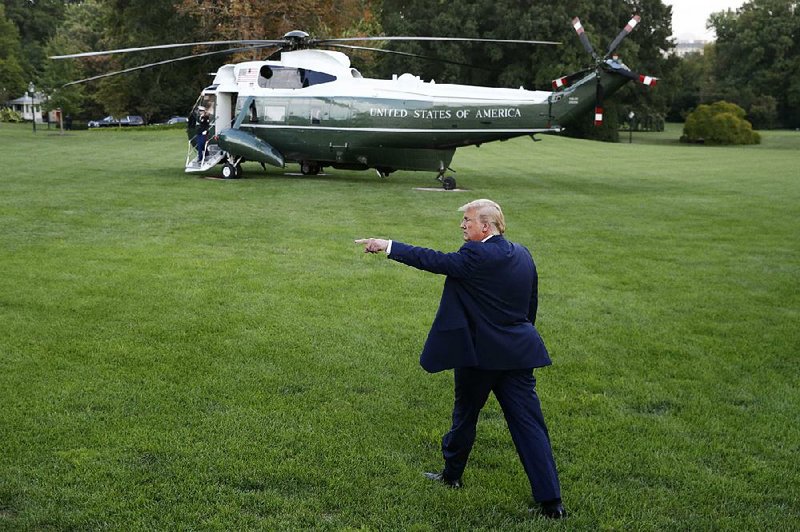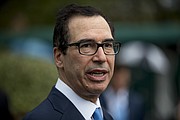WASHINGTON -- The United States and China traded conciliatory gestures Thursday, raising hopes they can de-escalate a standoff over trade that has shaken financial markets and cast gloom over the global economy.
In Beijing, China's Commerce Ministry said Thursday that Chinese importers are asking U.S. suppliers for prices of soybeans, pork and other farm goods. It's a sign they might step up purchases of American agricultural products, a possible goodwill gesture ahead of talks next month aimed at ending the tariff war.
"It is expected that China will be buying large amounts of our agricultural products!" U.S. President Donald Trump said Thursday on Twitter.
China's Ministry of Commerce said some Chinese companies were beginning to make inquiries about resuming purchases of U.S. agricultural products. "Soybeans and pork are all within the scope of inquiry," said Gao Feng, a spokesman for the ministry. "I hope that China and the United States will move in the same direction and create favorable conditions for consultations."
The statement from China followed Trump's decision Wednesday to postpone by two weeks a deadline to increase tariffs on $250 billion worth of Chinese goods to 30% from 25%.
Trump administration officials have discussed offering a limited trade agreement to China that would delay and even roll back some U.S. tariffs for the first time in exchange for Chinese commitments on intellectual property and agricultural purchases, according to five people familiar with the matter.
"It's something we would consider, I guess," Trump told reporters Thursday at the White House, referring to an interim agreement.
U.S. Treasury Secretary Steven Mnuchin told reporters Thursday that China asked that the tariff increase be rescheduled from Oct. 1, the 70th anniversary of the founding of the People's Republic of China. Trump delayed the tariff increase to Oct. 15 in what Mnuchin called a "goodwill gesture to the Chinese."
The Treasury secretary said midlevel U.S. and Chinese negotiators will meet next week or the week after. Then a high-level Chinese delegation is likely to travel to Washington to meet with Mnuchin and U.S. Trade Representative Robert Lighthizer. "My expectation is they'll be here in October unless something changes," Mnuchin said.
Mnuchin would not comment on whether the United States and China are discussing an agreement that is smaller in scope than they originally hoped. But asked about thorny issues, he made clear that the unrest in Hong Kong would not be part of the trade talks.
"Hong Kong is definitely not on the table," he said. "That's an issue for the secretary of state to deal with. That's not a trade issue."
The gestures Wednesday and Thursday appear meant to reduce tension ahead of the talks. U.S. stocks, highly sensitive to the ups and downs of the negotiations, rose in early trading before giving up most of the gains by late morning.
Trump's tariff threats against China have weighed heavily on markets, as the trade war's effect on the economy has become more obvious in recent months. A manufacturing index published this month showed American factory activity contracting for the first time in three years, while an index of consumer sentiment reflected the biggest decline since 2012, where 1 in 3 consumers spontaneously mentioned tariffs.
"These actions seem designed to get the China trade talks back on track," said Amanda DeBusk, a partner at the law firm Dechert LLP.
By delaying the tariff increase, Trump allowed for the possibility the two countries might make enough progress to avert the increase indefinitely. However, economists say a final agreement is unlikely this year.
Some White House officials played down the significance of Trump's reprieve on Thursday.
"It's a small thing in the scheme of things," Peter Navarro, Trump's trade adviser, said on CNN, noting that the delay was for only two weeks. "The Chinese are paying the tariffs anyway."
Navarro also seemed skeptical that China would actually step up its purchases of U.S. agricultural products.
"Let's see if the Chinese fulfill their commitments," he said. "The problem we've always had with the Chinese is that they don't necessarily honor their commitments."
The U.S.-China talks have basically gone nowhere for four months.
The world's two biggest economies are fighting over Beijing's ambitions to make China a world leader in advanced technologies such as artificial intelligence and robotics. The United States, Europe, Japan and other trading partners claim that Beijing has resorted to predatory tactics as part of the campaign, including stealing trade secrets and forcing foreign companies to hand over technology to gain access to the Chinese market.
The U.S. and China have imposed import taxes on hundreds of billions of dollars' worth of each other's products in a tariff war that has weighed on global trade and economic growth and created uncertainty for businesses deciding where to situate factories, find suppliers and sell their products.
The two countries appeared to be nearing a deal in early May. But relations deteriorated and talks stalled after the U.S. accused China of reneging on earlier commitments.
"There have been so many ups and downs in the talks that it is hard to predict whether the new conciliatory actions will lead to a deal," said DeBusk, a former Commerce Department trade official. "The economic situation may create additional impetus for a deal. On the other hand, the Chinese have a long-term horizon, and they may be reluctant to take a deal that could give Trump a victory for his re-election campaign. "
The details of the trade agreement the United States is discussing with China are tightly held. But they have revolved around China strengthening its protections for U.S. intellectual property, opening up its markets to competition from U.S. companies and making large purchases of U.S. products, such as natural gas and soybeans.
The Trump administration has also pressed China to make more structural changes, for example rolling back the influence of state-owned enterprises in its economy. But China has balked at making any concessions it sees as compromising its ability to manage its economy or signing a deal it perceives as uneven. For their part, the Chinese have demanded the rollback of the tariffs Trump has placed on $360 billion of Chinese products, as well as leniency for Huawei Technologies, the Chinese telecom giant the United States has cut off from purchasing U.S. supplies.
Information for this article was contributed by Joe McDonald, Paul Wiseman and Jill Colvin of The Associated Press; by Ana Swanson and Alan Rappeport of The New York Times; and by Josh Wingrove of Bloomberg News.
A Section on 09/13/2019



